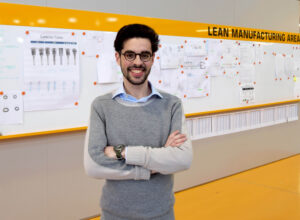Comac, Japan and Lean production – Interview with Federico Monti
A few months ago we talked to Stefano Gotti, our manager for Planning and Scheduling Operations and our Comac champion on Lean production. Today we get back on the subject interviewing Federico Monti

A few months ago we talked to Stefano Gotti, our manager for Planning and Scheduling Operations and our Comac champion on Lean production. Today we get back on the subject interviewing Federico Monti, the new entry in this department that, since last October, started working in our warehouse and is now part of our Lean team. Lean philosophy is one of Federico’s passions, together with his love for the Japanese idiom and culture, and for Japan, the country where this method took origin.
Federico, how did you approach the Lean method?
“Japan has always fascinated me, I first took a degree in Eastern languages at the Venice university Ca’ Foscari to learn the language, then I followed a master’s degree programme in International Management in London and I am currently attending another master’s programme on Lean Management, at the CUOA, Centro Universitario di Organizzazione Aziendale (a university department of business organization) in Vicenza”.
What are the principles of the Lean philosophy?
“There are 5 principles defined as the”5 S” methodology because the Japanese words from which they come from all begin with this letter. Here they are, in the following order:
– Seiri (Sort)
– Seiton (Set In Order)
– Seiso (Shine)
– Seiketsu (Standardize)
– Shitsuke (Sustain)
They represent the phases through which a lean production line must be thought of and implemented. The shared objective must be a reduction of waste and a saving of time”
How is lean philosophy implemented, substantially, at Comac?
“We choose to produce the necessary quantity, only when needed, the so-called Just-In-Time approach, which is also applicable to the warehouse via the Kanban”
What is it?
“Kanban” means card in Japanese. These cards have been attached to all the materials in the warehouse. The principle is the same as that applied in supermarkets – When we take something from the shelves, the card is being detached. In this way, the warehouse knows there is one less element, with that precise code, and that the element can be replaced or, in case of a shortage of supplies, ordered again.
One last question: in your opinion, can the lean philosophy be applied outside a working space?
“Sure. It is an excellent method to clean and tidy up your desk, your room or the other spaces we live in daily.